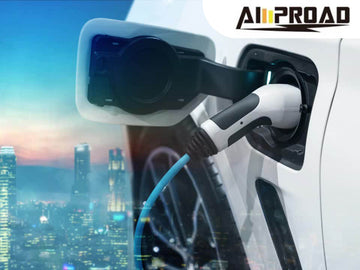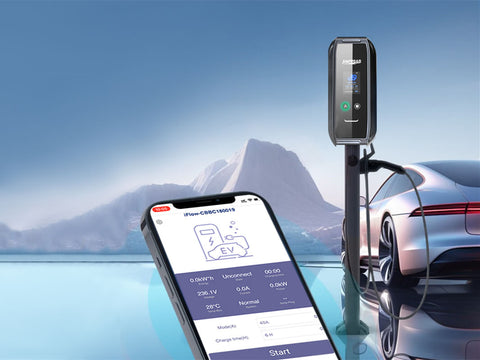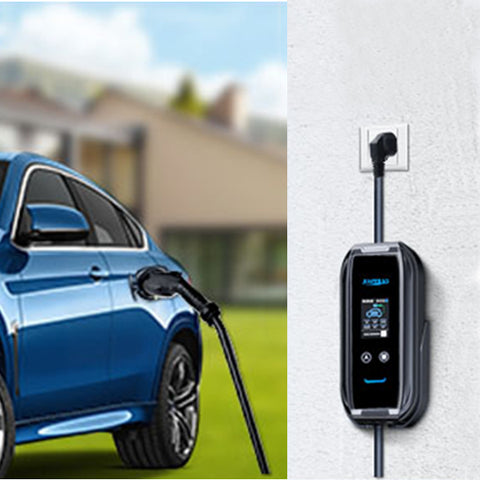
Thinking about ditching the gas station for home EV charging? Great choice! But to maximize convenience, consider a Level 2 charger. Unlike Level 1 chargers that plug into a regular outlet (like you use for your phone), Level 2 chargers are hardwired and deliver more power (typically 240 volts). This translates to significantly faster charging times - we're talking hours instead of a whole day to fully charge your EV. Let's explore if a Level 2 charger is the right fit for your home EV charging needs.
Is A Level 2 EV Charger Suitable for Home EV Charging
Electric vehicle (EV) owners often consider installing a Level 2 EV charger at home for faster and more convenient charging. However, before making this decision, it's essential to evaluate whether a Level 2 charger is suitable for your specific needs and electrical system.
Compatibility with Your Electrical System
One of the primary considerations when installing a Level 2 EV charger at home is compatibility with your existing electrical system.
Voltage Requirements
Level 2 chargers typically operate at 240 volts (V), which is higher than the standard household voltage of 120V. Therefore, it's essential to ensure that your home's electrical system can support the higher voltage requirement of a Level 2 charger.
Checking Existing Outlets or Need for Electrician
Start by checking the outlets in your garage or the area where you plan to install the EV charger. Standard household outlets are typically 120V, which may not be sufficient for Level 2 charging. If your outlets are not compatible, you may need to hire an electrician to install a dedicated circuit for the Level 2 charger. This involves running wiring from your electrical panel to the location of the charger and installing a new outlet specifically designed for Level 2 charging.
Considerations for Your Needs
In addition to compatibility with your electrical system, it's essential to consider your specific charging needs and habits when deciding whether a Level 2 EV charger is suitable for home charging.
Typical Driving Range and Daily Charging Requirements
Evaluate your typical driving habits and the range of your electric vehicle. If you frequently drive long distances or have a vehicle with a larger battery capacity, you may benefit from the faster charging speeds offered by a Level 2 charger. Level 2 chargers can significantly reduce charging times compared to standard Level 1 chargers, allowing you to recharge your vehicle more quickly and efficiently.
Available Charging Time at Home
Consider the amount of time your vehicle is parked at home and available for charging. Level 2 chargers offer faster charging speeds than Level 1 chargers, making them ideal for overnight charging or during extended periods of vehicle downtime. If you have sufficient time to charge your vehicle at home overnight or during off-peak hours, a Level 2 charger can provide the convenience of a fully charged battery each morning without the need for frequent trips to public charging stations.
Though EVSE Level 2 chargers offer faster charging speeds and greater convenience for home EV charging, it's essential to consider factors such as compatibility with your electrical system, your driving habits, and available charging time at home before making a decision. Evaluating these factors will help determine whether a Level 2 EV charger is suitable for your specific needs and circumstances.
How to Install and Use Level 2 EV Charger at Home?

Installing and using a Level 2 EV charger at home can significantly enhance the convenience and efficiency of electric vehicle (EV) charging. Here's a guide on how to install and use a Level 2 EV charger:
Electrician Involvement for Installation (Highly Recommended)
Assessment of Electrical System: Before installing a Level 2 EV charger, it's crucial to assess your home's electrical system to ensure compatibility. An electrician can inspect your electrical panel and wiring to determine if modifications are necessary to support the charger's voltage and current requirements.
- Installation of Dedicated Circuit: In most cases, installing a Level 2 EV charger requires a dedicated circuit to handle the higher voltage and current. An electrician can install a dedicated circuit from your electrical panel to the location of the charger, ensuring safe and reliable operation.
- Mounting and Wiring: Once the dedicated circuit is in place, the electrician will mount the charger to the wall or charging pedestal and connect it to the wiring. Proper wiring and mounting are essential for safety and optimal performance.
- Testing and Certification: After installation, the electrician will test the charger to ensure it is functioning correctly and safely. They may also provide certification to verify compliance with electrical codes and regulations.
Basic Steps for Using a Level 2 Charger at Home
- Plug in the Charger: Start by plugging the Level 2 charger into the dedicated outlet installed by the electrician. Ensure that the charger is securely connected to the outlet to prevent any safety hazards.
- Connect the Vehicle: Follow the specific instructions provided by the charger manufacturer to connect your EV to the charger. This may involve using a charging cable with the appropriate connector for your vehicle and securely plugging it into the charging port.
- Start the Charging Process: Once the EV is connected to the charger, you can start the charging process using the controls or interface provided by the charger. Some chargers may have additional features such as scheduling or power adjustment options, so refer to the charger's instructions for guidance.
- Monitor the Charging Progress: Keep an eye on the charging progress using the charger's display or any companion mobile apps or software provided by the manufacturer. This allows you to track the charging status and estimated time to completion.
- Disconnect and Store: Once the EV is fully charged or you no longer need to charge, safely disconnect the charging cable from the vehicle's charging port and store it in a secure location.
By following these steps and consulting with a qualified electrician for installation, you can effectively install and use a level 2 electric car charger at home, ensuring safe and efficient charging for your electric vehicle.
How to Choose a Level 2 EV Charger for Home Charging?

Selecting the right Level 2 EV charger for home charging is crucial for ensuring efficient and reliable charging of your electric vehicle (EV). Here are some key factors to consider when choosing a Level 2 EV charger:
- Compatibility with Your EV: Ensure that the charger you choose is compatible with your specific make and model of electric vehicle. Different EVs may require different charging connectors or have varying power requirements, so it's essential to select a charger that meets the specifications of your vehicle.
- Power Output: Consider the power output of the charger, typically measured in kilowatts (kW). Higher power output chargers can charge your EV faster, but they may also require a dedicated circuit with higher amperage. Evaluate your charging needs and available electrical capacity to determine the appropriate power output for your charger.
- Versatility and Portability: If you anticipate charging your EV at multiple locations or need the flexibility to take your charger with you on road trips, consider a versatile and portable Level 2 EV charger. Products like the AMPROAD versatile portable Level 2 EV charger offer the convenience of charging at home or on the go, making them ideal for EV owners with diverse charging needs.
- Smart Features: Look for chargers with smart features such as Wi-Fi connectivity, mobile app integration, and scheduling capabilities. These features allow you to monitor and control your charging sessions remotely, optimize charging times to take advantage of off-peak electricity rates, and receive notifications when charging is complete or interrupted.
- Safety and Durability: Choose a charger that prioritizes safety and durability. Look for certifications such as UL listing or certification from reputable testing organizations. Additionally, consider factors such as weatherproofing, rugged construction, and built-in protection features to ensure reliable and safe charging in various conditions.
- Ease of Installation: Opt for a Level 2 EV charger that is easy to install and compatible with your home's electrical system. Consider whether you need professional installation and factor in any additional costs associated with electrical upgrades or modifications.
By considering these factors and choosing a Level 2 EV charger that meets your specific needs and preferences, you can enjoy convenient and reliable charging for your electric vehicle at home.
Choosing Between Level 1 and Level 2 Chargers for Home EV Charging
Level 2 charger can be an excellent option for home EV charging, offering faster charging speeds and greater convenience compared to a Level 1 charger. However, whether it's suitable for your specific needs depends on various factors.
Considerations for Level 2 Charger Suitability
Driving Habits: If you frequently drive long distances or have a larger battery capacity EV, a Level 2 charger can significantly reduce charging times and provide the convenience of a fully charged battery each morning.
- Available Charging Time: If you have sufficient time for overnight charging or during extended periods of vehicle downtime, a Level 2 charger can efficiently charge your EV, allowing you to maximize its range without the need for frequent trips to public charging stations.
- Electrical System Compatibility: It's essential to ensure that your home's electrical system can support the higher voltage and current requirements of a Level 2 charger. If your existing outlets are not compatible, you may need to hire an electrician to install a dedicated circuit.
Alternatives if Level 2 Charger is Not Feasible
If a Level 2 charger is not feasible for your home EV charging needs, you can consider using a Level 1 charger as an alternative. While Level 1 chargers provide slower charging speeds compared to Level 2 chargers, they can still effectively charge your EV overnight using a standard household outlet. Level 1 chargers are also more straightforward to install and require minimal electrical modifications.
FAQs / People Also Ask
Q1: What is a Level 2 EV charger?
A1: A Level 2 EV charger is a charging station that provides faster charging for electric vehicles compared to standard Level 1 chargers. It typically operates at 240 volts (V) and requires professional installation.
Q2: Can I charge my EV at home with a Level 2 charger?
A2: Yes, you can charge your electric vehicle at home with a Level 2 charger, provided you have access to a compatible electrical outlet or have a dedicated circuit installed by a qualified electrician.
Q3: How does a Level 2 charger differ from a Level 1 charger?
A3: Level 2 chargers operate at a higher voltage (240V) and offer faster charging speeds compared to Level 1 chargers, which operate at standard household voltage (120V). Level 2 chargers are ideal for home charging and can fully charge most EVs overnight.
Q4: Do I need a dedicated circuit for a Level 2 charger at home?
A4: It is highly recommended to have a dedicated circuit installed for a Level 2 charger to ensure safe and reliable charging. This involves hiring a qualified electrician to assess your electrical system and install the necessary wiring and circuit breaker.
Q5: Can I install a Level 2 charger myself?
A5: While some Level 2 chargers come with installation instructions for DIY installation, it is generally recommended to hire a professional electrician for installation. This ensures compliance with electrical codes and regulations and reduces the risk of electrical hazards.
Q6: How long does it take to charge an EV with a Level 2 charger at home?
A6: Charging times with a Level 2 charger vary depending on factors such as the EV's battery size and charging speed. However, Level 2 chargers can typically fully charge an EV overnight, making them convenient for daily charging needs.
Q7: Are there any safety considerations when using a Level 2 charger at home?
A7: It's essential to follow safety guidelines and manufacturer recommendations when using a Level 2 charger at home. This includes ensuring the charger is properly installed, using a dedicated circuit, and regularly inspecting the charger and electrical connections for any signs of damage or wear.
Q8: Can I use a Level 2 charger with renewable energy sources?
A8: Yes, Level 2 chargers can be integrated with renewable energy sources such as solar or wind power. This allows EV owners to charge their vehicles using clean energy, reducing environmental impact and promoting sustainability.
Q9: Are there any incentives or rebates available for installing a Level 2 charger at home?
A9: Depending on your location, there may be incentives or rebates available for installing a Level 2 charger at home. These incentives are often provided by government agencies or utility companies to encourage the adoption of electric vehicles and charging infrastructure.



